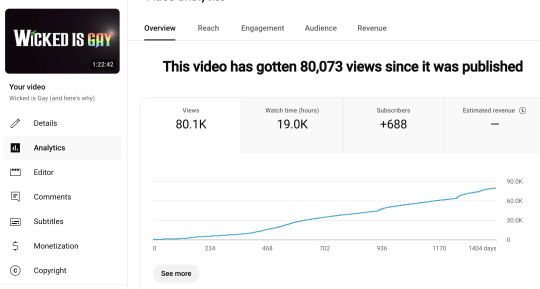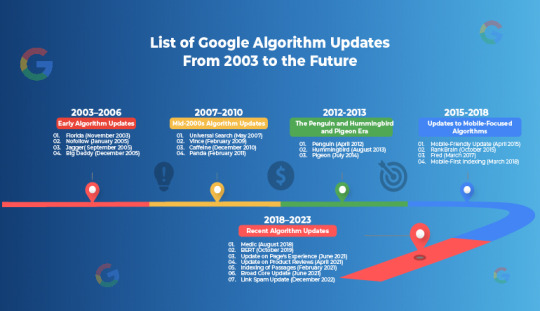#Google SEO Algorithms
Explore tagged Tumblr posts
Text
Google is (still) losing the spam wars to zombie news-brands

I'm touring my new, nationally bestselling novel The Bezzle! Catch me TONIGHT (May 3) in CALGARY, then TOMORROW (May 4) in VANCOUVER, then onto Tartu, Estonia, and beyond!

Even Google admits – grudgingly – that it is losing the spam wars. The explosive proliferation of botshit has supercharged the sleazy "search engine optimization" business, such that results to common queries are 50% Google ads to spam sites, and 50% links to spam sites that tricked Google into a high rank (without paying for an ad):
https://developers.google.com/search/blog/2024/03/core-update-spam-policies#site-reputation
It's nice that Google has finally stopped gaslighting the rest of us with claims that its search was still the same bedrock utility that so many of us relied upon as a key piece of internet infrastructure. This not only feels wildly wrong, it is empirically, provably false:
https://downloads.webis.de/publications/papers/bevendorff_2024a.pdf
Not only that, but we know why Google search sucks. Memos released as part of the DOJ's antitrust case against Google reveal that the company deliberately chose to worsen search quality to increase the number of queries you'd have to make (and the number of ads you'd have to see) to find a decent result:
https://pluralistic.net/2024/04/24/naming-names/#prabhakar-raghavan
Google's antitrust case turns on the idea that the company bought its way to dominance, spending the some of the billions it extracted from advertisers and publishers to buy the default position on every platform, so that no one ever tried another search engine, which meant that no one would invest in another search engine, either.
Google's tacit defense is that its monopoly billions only incidentally fund these kind of anticompetitive deals. Mostly, Google says, it uses its billions to build the greatest search engine, ad platform, mobile OS, etc that the public could dream of. Only a company as big as Google (says Google) can afford to fund the R&D and security to keep its platform useful for the rest of us.
That's the "monopolistic bargain" – let the monopolist become a dictator, and they will be a benevolent dictator. Shriven of "wasteful competition," the monopolist can split their profits with the public by funding public goods and the public interest.
Google has clearly reneged on that bargain. A company experiencing the dramatic security failures and declining quality should be pouring everything it has to righting the ship. Instead, Google repeatedly blew tens of billions of dollars on stock buybacks while doing mass layoffs:
https://pluralistic.net/2024/02/21/im-feeling-unlucky/#not-up-to-the-task
Those layoffs have now reached the company's "core" teams, even as its core services continue to decay:
https://qz.com/google-is-laying-off-hundreds-as-it-moves-core-jobs-abr-1851449528
(Google's antitrust trial was shrouded in secrecy, thanks to the judge's deference to the company's insistence on confidentiality. The case is moving along though, and warrants your continued attention:)
https://www.thebignewsletter.com/p/the-2-trillion-secret-trial-against
Google wormed its way into so many corners of our lives that its enshittification keeps erupting in odd places, like ordering takeout food:
https://pluralistic.net/2023/02/24/passive-income/#swiss-cheese-security
Back in February, Housefresh – a rigorous review site for home air purifiers – published a viral, damning account of how Google had allowed itself to be overrun by spammers who purport to provide reviews of air purifiers, but who do little to no testing and often employ AI chatbots to write automated garbage:
https://housefresh.com/david-vs-digital-goliaths/
In the months since, Housefresh's Gisele Navarro has continued to fight for the survival of her high-quality air purifier review site, and has received many tips from insiders at the spam-farms and Google, all of which she recounts in a followup essay:
https://housefresh.com/how-google-decimated-housefresh/
One of the worst offenders in spam wars is Dotdash Meredith, a content-farm that "publishes" multiple websites that recycle parts of each others' content in order to climb to the top search slots for lucrative product review spots, which can be monetized via affiliate links.
A Dotdash Meredith insider told Navarro that the company uses a tactic called "keyword swarming" to push high-quality independent sites off the top of Google and replace them with its own garbage reviews. When Dotdash Meredith finds an independent site that occupies the top results for a lucrative Google result, they "swarm a smaller site’s foothold on one or two articles by essentially publishing 10 articles [on the topic] and beefing up [Dotdash Meredith sites’] authority."
Dotdash Meredith has keyword swarmed a large number of topics. from air purifiers to slow cookers to posture correctors for back-pain:
https://housefresh.com/wp-content/uploads/2024/05/keyword-swarming-dotdash.jpg
The company isn't shy about this. Its own shareholder communications boast about it. What's more, it has competition.
Take Forbes, an actual news-site, which has a whole shadow-empire of web-pages reviewing products for puppies, dogs, kittens and cats, all of which link to high affiliate-fee-generating pet insurance products. These reviews are not good, but they are treasured by Google's algorithm, which views them as a part of Forbes's legitimate news-publishing operation and lets them draft on Forbes's authority.
This side-hustle for Forbes comes at a cost for the rest of us, though. The reviewers who actually put in the hard work to figure out which pet products are worth your money (and which ones are bad, defective or dangerous) are crowded off the front page of Google and eventually disappear, leaving behind nothing but semi-automated SEO garbage from Forbes:
https://twitter.com/ichbinGisele/status/1642481590524583936
There's a name for this: "site reputation abuse." That's when a site perverts its current – or past – practice of publishing high-quality materials to trick Google into giving the site a high ranking. Think of how Deadspin's private equity grifter owners turned it into a site full of casino affiliate spam:
https://www.404media.co/who-owns-deadspin-now-lineup-publishing/
The same thing happened to the venerable Money magazine:
https://moneygroup.pr/
Money is one of the many sites whose air purifier reviews Google gives preference to, despite the fact that they do no testing. According to Google, Money is also a reliable source of information on reprogramming your garage-door opener, buying a paint-sprayer, etc:
https://money.com/best-paint-sprayer/
All of this is made ten million times worse by AI, which can spray out superficially plausible botshit in superhuman quantities, letting spammers produce thousands of variations on their shitty reviews, flooding the zone with bullshit in classic Steve Bannon style:
https://escapecollective.com/commerce-content-is-breaking-product-reviews/
As Gizmodo, Sports Illustrated and USA Today have learned the hard way, AI can't write factual news pieces. But it can pump out bullshit written for the express purpose of drafting on the good work human journalists have done and tricking Google – the search engine 90% of us rely on – into upranking bullshit at the expense of high-quality information.
A variety of AI service bureaux have popped up to provide AI botshit as a service to news brands. While Navarro doesn't say so, I'm willing to bet that for news bosses, outsourcing your botshit scams to a third party is considered an excellent way of avoiding your journalists' wrath. The biggest botshit-as-a-service company is ASR Group (which also uses the alias Advon Commerce).
Advon claims that its botshit is, in fact, written by humans. But Advon's employees' Linkedin profiles tell a different story, boasting of their mastery of AI tools in the industrial-scale production of botshit:
https://housefresh.com/wp-content/uploads/2024/05/Advon-AI-LinkedIn.jpg
Now, none of this is particularly sophisticated. It doesn't take much discernment to spot when a site is engaged in "site reputation abuse." Presumably, the 12,000 googlers the company fired last year could have been employed to check the top review keyword results manually every couple of days and permaban any site caught cheating this way.
Instead, Google is has announced a change in policy: starting May 5, the company will downrank any site caught engaged in site reputation abuse. However, the company takes a very narrow view of site reputation abuse, limiting punishments to sites that employ third parties to generate or uprank their botshit. Companies that produce their botshit in-house are seemingly not covered by this policy.
As Navarro writes, some sites – like Forbes – have prepared for May 5 by blocking their botshit sections from Google's crawler. This can't be their permanent strategy, though – either they'll have to kill the section or bring it in-house to comply with Google's rules. Bringing things in house isn't that hard: US News and World Report is advertising for an SEO editor who will publish 70-80 posts per month, doubtless each one a masterpiece of high-quality, carefully researched material of great value to Google's users:
https://twitter.com/dannyashton/status/1777408051357585425
As Navarro points out, Google is palpably reluctant to target the largest, best-funded spammers. Its March 2024 update kicked many garbage AI sites out of the index – but only small bottom-feeders, not large, once-respected publications that have been colonized by private equity spam-farmers.
All of this comes at a price, and it's only incidentally paid by legitimate sites like Housefresh. The real price is borne by all of us, who are funneled by the 90%-market-share search engine into "review" sites that push low quality, high-price products. Housefresh's top budget air purifier costs $79. That's hundreds of dollars cheaper than the "budget" pick at other sites, who largely perform no original research.
Google search has a problem. AI botshit is dominating Google's search results, and it's not just in product reviews. Searches for infrastructure code samples are dominated by botshit code generated by Pulumi AI, whose chatbot hallucinates nonexistence AWS features:
https://www.theregister.com/2024/05/01/pulumi_ai_pollution_of_search/
This is hugely consequential: when these "hallucinations" slip through into production code, they create huge vulnerabilities for widespread malicious exploitation:
https://www.theregister.com/2024/03/28/ai_bots_hallucinate_software_packages/
We've put all our eggs in Google's basket, and Google's dropped the basket – but it doesn't matter because they can spend $20b/year bribing Apple to make sure no one ever tries a rival search engine on Ios or Safari:
https://finance.yahoo.com/news/google-payments-apple-reached-20-220947331.html
Google's response – laying off core developers, outsourcing to low-waged territories with weak labor protections and spending billions on stock buybacks – presents a picture of a company that is too big to care:
https://pluralistic.net/2024/04/04/teach-me-how-to-shruggie/#kagi
Google promised us a quid-pro-quo: let them be the single, authoritative portal ("organize the world’s information and make it universally accessible and useful"), and they will earn that spot by being the best search there is:
https://www.ft.com/content/b9eb3180-2a6e-41eb-91fe-2ab5942d4150
But – like the spammers at the top of its search result pages – Google didn't earn its spot at the center of our digital lives.
It cheated.

If you'd like an essay-formatted version of this post to read or share, here's a link to it on pluralistic.net, my surveillance-free, ad-free, tracker-free blog:
https://pluralistic.net/2024/05/03/keyword-swarming/#site-reputation-abuse

Image: freezelight (modified) https://commons.wikimedia.org/wiki/File:Spam_wall_-_Flickr_-_freezelight.jpg
CC BY-SA 2.0 https://creativecommons.org/licenses/by-sa/2.0/deed.en
#pluralistic#google#monopoly#housefresh#content mills#sponcon#seo#dotdash meredith#keyword swarming#iac#forbes#forbes advisor#deadspin#money magazine#ad practicioners llc#asr group holdings#sports illustrated#advon#site reputation abuse#the algorithm tm#core update#kagi#ai#botshit
906 notes
·
View notes
Text

So the Wicked is Gay video just reach 80k views and 1) I obviously love that it still consistently gets views each day, especially since this video is nearing it's 4 (!) year anniversary.
but 2) i especially love to think that's bc every night about 50 people walk out of the theater and go "hmm 🤨"
#wicked#wicked the musical#gelphie#i just checked and this video didn't even have 10k in its first year (!)#so thank you ppl who keep googling 'is wicked gay?' the last 4 years#this video got copyright struck so i don't make a cent off of it#but i still appreciate it lol#SEO is weird man im just putting that out there#most videos plateau after a while which makes sense#and sometimes a video just keeps raking in the views and you just gotta shrug and go 'idk thats the algorithm lol'
109 notes
·
View notes
Text
Google Algorithm Updates

Early Algorithm Updates (2003–2006) Florida (November 2003) Nofollow (January 2005) Jagger( September 2005) Big Daddy (December 2005)
Mid-2000s Algorithm Updates (2007–2010) Universal Search (May 2007) Vince (February 2009) Caffeine (December 2010) Panda (February 2011)
The Penguin and Hummingbird and Pigeon Era (2012–2013) Penguin (April 2012) Hummingbird (August 2013) Pigeon (July 2014)
Updates to Mobile-Focused Algorithms (2015–2018) Mobile-Friendly Update (April 2015) RankBrain (October 2015) Fred (March 2017) Mobile-First Indexing (March 2018) Recent Algorithm Updates (2018–2023) Medic (August 2018) BERT (October 2019) Broad Core Update (June 2021) Link Spam Update (December 2022)
To Know More About Google Algorithm Updates
8 notes
·
View notes
Text
I made an angry post about this recently but google has literally become functionally useless over the last few months and like. I don’t think I realized just how horrible it’d be
#lous clues#it’s not just google it’s every search engine I can think of#something changed in algorithm or SEO or something. I don’t know enough#but it’s fucking changed
4 notes
·
View notes
Text
#seo#search engine optimization#on page seo#seo marketing#seo optimization#content marketing#google algorithm#search eninge#develop#google seo#seo services#search engine marketing#seo expert
3 notes
·
View notes
Text
E-commerce SEO Strategies Unveiled: Boosting Sales and Visibility

In the ever-evolving landscape of e-commerce, staying ahead of the competition requires not only a compelling product but also a well-optimized online presence. In this comprehensive guide, we will delve into the world of E-commerce SEO optimization. No buzzwords, just actionable insights to enhance your online store's visibility and boost sales. Let's get started
Understanding the Basics
To lay a solid foundation, let's start with the basics. E-commerce SEO optimization involves a series of on-page and off-page strategies aimed at improving your website's ranking on search engine results pages (SERPs). This optimization is pivotal for attracting high-quality organic traffic, increasing sales, and staying competitive in the digital marketplace.
Keyword Research
The cornerstone of any successful SEO campaign is thorough keyword research. Begin by compiling a list of relevant keywords that reflect your products, services, and industry. In addition to your primary keywords, consider long-tail keywords, as they often have less competition and can yield highly targeted traffic. For instance, if you're a digital marketing agency in Seattle, keywords like "digital marketing services in Seattle" and "Seattle SEO company" are goldmines.
On-Page Optimization
High-Quality Content: Your website's content should not only be unique but also provide value to your audience. Craft product descriptions, blog posts, and landing pages that resonate with your target audience. Incorporate the primary and long-tail keywords naturally within the content while maintaining readability and a professional writing style.
Page Titles and Meta Descriptions: Ensure that each page has a unique and descriptive title tag and meta description. These elements should include relevant keywords and provide a concise summary of the page's content. This encourages users to click through to your website from the search results.
Header Tags: Use header tags (H1, H2, H3, etc.) to structure your content. This not only improves readability but also helps search engines understand the hierarchy of information on your pages.
User Experience (UX) Matters
Google values user experience, so make sure your website is user-friendly. Optimize for mobile devices, improve page load times, and ensure intuitive navigation. A seamless UX not only pleases visitors but also satisfies search engine algorithms.
Backlink Building
Off-page SEO is as crucial as on-page optimization. Seek high-quality backlinks from reputable websites in your industry. Guest posting, influencer collaborations, and participating in industry forums can all help in this regard.
Monitoring and Analytics
Track your SEO efforts using tools like Google Analytics and Google Search Console. Regularly review your website's performance, make necessary adjustments, and stay updated on SEO trends and algorithm changes.
Conclusion:
In the ever-competitive world of e-commerce, mastering SEO optimization is your key to success. By adhering to these strategies and tips, you can enhance your website's visibility, drive organic traffic, and ultimately boost your sales. If you're seeking expert assistance, consider partnering with AE Tech Design Agency, your trusted SEO company in Seattle. Contact us today to explore how our digital marketing services can elevate your online presence and drive meaningful results.
Remember, the world of SEO is constantly evolving, so staying informed and adapting your strategies accordingly is essential for long-term success.
#E-commerce SEO#SEO Optimization#E-commerce Strategies#SEO Tips#Organic Traffic#Search Engine Rankings#Keyword Research#On-Page SEO#Off-Page SEO#User Experience (UX)#Backlink Building#Local SEO#Google Analytics#Digital Marketing#SEO Trends#SEO Algorithm#Online Visibility#Website Performance#SEO Company#Seattle Digital Marketing
6 notes
·
View notes
Text
September 2023 Helpful Content Update
youtube
#seo services#google algorithm#google updates#content creator#content creation#content marketing#content seller#premium content#Youtube
2 notes
·
View notes
Text
#Algorithm Updates#Ranking Algorithm Updates#Google Ranking Algorithm Updates#Google Tracking#SEO#Webmasters#Web Ranking#website traffic#ranking#ranking updates#digital marketing
4 notes
·
View notes
Text

Search engine algorithms are constantly evolving to provide better search results. #SEO helps you stay ahead by adapting to these updates. By regularly monitoring algorithm changes and adjusting your strategy accordingly, you can maintain your rankings and ensure your website remains visible to your target audience.
Boost your Website.
2 notes
·
View notes
Text
AI Videos That Rank: What Every Creator Needs to Know About SEO

We live in a time where making videos has never been easier. With tools such as Google Veo 3, for example, you don't need to hire a production team or have advanced editing skills to create professional-looking videos. Considered one of the finest AI video generators out today, it helps creators convert their idea into engaging video content with a few clicks.
So, creating a video is great; however, if no one watches it, it is not going to do a lot for your brand or message. Here is where SEO (Search Engine Optimisation) comes into play.
Great Videos Deserve to Be Seen
You may think creating a great video is going to be enough. However, creating is only one part of the journey. Getting your video on to Google or other search platforms is what is meaningful.
In 2025, the internet is overflowing with video content. Without the right SEO strategies, your video could be lost in a sea of noise. Great videos don't do anything if they aren't search optimised. This is the reason why it is important to understand how SEO marketing in 2025 will work.
What Is Video Schema SEO and Why It Matters
Let’s break this down simply. Video schema SEO is a way to help Google understand the details of your video. Think of it as adding labels behind the scenes—like the video’s title, when it was uploaded, how long it is, and what it’s about.
When you use schema correctly, it gives your video a better chance to show up in search results, previews, or even video-rich snippets. Without it, Google might not even know what your video is about.
So if you’re using something powerful like Google Veo 3 to create content, adding schema is the next step to make sure that content reaches your audience.
How Google Video 3 and SEO Work Together
Making videos with Google Veo 3 gives you a big head start. But to make sure people actually find those videos, you need smart SEO. This includes writing titles that are clear and match what people search for, like 'best AI video generator' or 'SEO marketing 2025'.
Your description should be short and natural and explain what your video is about. Avoid stuffing in too many keywords—just focus on what your viewers would want to know.
Also, make sure the page where your video is hosted is easy to use, mobile-friendly, and loads quickly. All of this helps your video climb higher in the ranking on search engines.
What Google Really Looks for in 2025
The Google Algorithm today is smarter than ever. It’s not just about keywords anymore—it’s about delivering helpful, high-quality content. If your video is useful, entertaining, or educational, and the page around it is well optimised, Google is more likely to feature it.
It’s really that simple. Help real people. Give value. And then help Google understand your content using SEO.
Conclusion
If you’ve made a great video using Google Veo 3, that’s a huge accomplishment. But don’t stop there. Make sure people actually find and watch it.
Use video schema SEO to give Google all the details it needs. Write clear, honest titles and descriptions. Make sure your page loads fast and works well on all devices. These steps are simple, but they make a huge difference in how your content performs online.
In a world filled with videos, what separates yours is how well it's optimised. With the right SEO, your content doesn’t just exist—it gets seen, shared, and remembered.
0 notes
Text
SEO in 2025: How Google's AI-Powered Search is Changing Content Strategy
If you thought SEO was already complicated, wait until you meet 2025. Google’s gone full throttle with AI, and if you’re not adapting your content strategy, you’re basically playing hide and seek—with blindfolds on. From smarter algorithms to predictive search, SEO in 2025 is a whole new ball game. So, what’s changing? And more importantly, how do you keep your content not just visible, but…
0 notes
Text
Search engine optimization evolves constantly amidst drastic changes in online algorithms and user behavior patterns now. Useful and effective strategies from last year may not work today and soon current tactics will probably become obsolete very quickly. Both SEO pros and biz owners gotta stay on their toes with new tech emerging and user behaviors going haywire pretty rapidly nowadays. Staying ahead of evolving SEO trends rapidly becomes very crucial for businesses.
#Google algorithm updates#SEO in 2025 and 26#SEO trends 2025#Google's guidelines#SEO in 2025#SEO trends
0 notes
Text
Google Search Ranking volatility April 22nd and 23rd
SEO professionals and webmasters are once again witnessing significant Google Search ranking volatility over the past few days, particularly between April 21 and April 23, 2025. While there’s no official confirmation of a Google algorithm update during this period, the evidence strongly suggests another round of ranking algorithm testing or adjustments. Unofficial Yet Consistent Volatility Across…
#GA4 real-time reporting issues#Google algorithm update April 2025#Google core update March 2025#Google Search ranking volatility#search engine ranking changes#SEO tracking tools#SERP fluctuations#unconfirmed Google update
1 note
·
View note
Text
Google Core Update Maret 2025: Cara Gue Bertahan dan Naik Rank

Beberapa minggu lalu, gue mulai ngerasa ada yang aneh. Salah satu artikel gue yang biasanya nangkring di page one, tiba-tiba hilang. Gue cek Search Console, traffic drop. Bukan cuma satu artikel, tapi hampir semua konten di kategori berita dan hiburan.
Awalnya gue kira cuma fluktuasi biasa. Tapi ternyata... ini gara-gara Google Core Update Maret 2025.
Gue mulai ngulik dan bandingin. Ternyata ada pola.
Artikel yang terlalu "SEO banget" yang gue buat dengan gaya lama: keyword masuk di H1, meta, sebar keyword di paragraf awal, dan lain-lain—justru anjlok. Padahal sebelumnya teknik itu selalu berhasil. Tapi sekarang? Kalah sama artikel yang gaya bahasanya lebih natural dan fokus ke pembaca, bukan ke mesin.
Dari situ gue mulai ubah pendekatan. Gue coba riset ulang. Bukan soal keyword doang, tapi gue mulai dari niat: artikel ini bantuin pembaca atau cuma buat dapet traffic?
Gue juga sempet eksperimen pakai AI buat beberapa konten. Tapi kali ini, gue gak copy hasilnya mentah-mentah. Gue ubah, gue tambahin insight pribadi, gue revisi gaya bahasanya biar lebih enak dibaca manusia. Hasilnya? Artikel itu balik naik pelan-pelan. Bahkan satu artikel soal properti yang gue anggap “sepele” malah naik drastis dan sekarang jadi salah satu traffic source tertinggi di blog gue.
Sektor lain kayak berita, e-commerce, bahkan hiburan yang sebelumnya ngasih traffic lumayan, sekarang kayaknya makin susah bersaing. Apalagi lawan kita media-media besar kayak Detik, Tempo, Ares188 bahkan Halodoc pun ikut kena. Tapi ya itu, siapa cepat adaptasi, dia yang bertahan.
Gue gak bilang semua artikel lama harus dihapus. Tapi sekarang gue mulai evaluasi: mana yang harus dirombak total, mana yang cukup dioptimasi ulang. Dan sejauh ini, strategi itu ngebantu banget.
Kalau lo masih pakai pola lama, mungkin ini saatnya mulai berpikir ulang. Fokus ke user experience. Nulis bukan buat ngejar mesin, tapi buat bantu orang yang baca.
Oh ya, beberapa insight dan inspirasi tulisan juga gue dapetin waktu mampir ke www.astriroma.com. Banyak referensi menarik buat yang lagi nyari gaya konten yang lebih genuine dan tetap perform.
#seo#google#google core update#google news#digital marketing#seotips#indonesia#Seo Lokal#google algorithm update#chatgpt#berita#berita hari ini
1 note
·
View note
Text
#seo#search engine optimization#on page seo#seo marketing#seo optimization#content marketing#google algorithm#search eninge#develop#google seo#seo services#search engine marketing#seo expert
5 notes
·
View notes
Text
Understanding Google’s Latest Algorithm Update: A Guide to Smarter SEO
Every time a Google algorithm update rolls out, it reshapes how websites are ranked and discovered online. For businesses relying on digital visibility, staying informed about these changes is vital. Google’s most recent update emphasizes user experience, performance metrics, and content relevance—reshaping the future of search engine optimization.
Why Google Algorithm Updates Matter
Google constantly fine-tunes its algorithm to provide better results to users. The latest Google algorithm update puts even more weight on modern SEO ranking factors that prioritize how people interact with your site. It’s no longer just about keywords—Google wants content that answers questions quickly, loads fast, and provides a seamless experience.
Core Web Vitals: A Major Ranking Signal
A big focus in this update is on Core Web Vitals—a set of performance metrics that gauge the user experience. These include:
Largest Contentful Paint (LCP) – How quickly your main content loads.
First Input Delay (FID) – How fast your site responds to user input.
Cumulative Layout Shift (CLS) – How stable your layout is during page load.
These vitals are now essential SEO ranking factors. Google rewards sites that deliver smooth, responsive, and fast-loading experiences. Websites that fall short may see a drop in search visibility.
To improve your Core Web Vitals, consider minimizing code bloat, enabling lazy loading for images, and using a reliable hosting solution. These changes not only help with rankings but also boost user satisfaction.
Elevating Content for Modern SEO
Another key part of this Google algorithm update is the shift toward helpful, human-first content. Google is cracking down on low-value, AI-generated, or keyword-stuffed pages. Instead, it favors original, well-researched content that directly addresses user intent.
As part of your search engine optimization strategy, focus on creating informative content written by experts. Use question-based headings, long-tail keywords, and real-world examples to make your content more useful and engaging.
Trust, Expertise, and Site Authority
Google continues to reward sites that demonstrate Expertise, Authoritativeness, and Trustworthiness (E-A-T)—especially for industries like health, finance, and legal services. This update further refines these signals by incorporating the user's on-page experience into the mix.
Establish credibility by showcasing author credentials, citing reputable sources, and keeping your content accurate and up to date. These trust signals contribute significantly to your SEO ranking factors.
The Future of Search Is AI and Intent
This update also reflects Google's growing ability to understand search intent through AI. Instead of matching exact keywords, Google evaluates the context of each query. That means your content should be written in a conversational, natural tone—designed to help users rather than just rank in search engines.
Final Thoughts
The latest Google algorithm update is a clear reminder: great search engine optimization is about more than just backlinks and keywords. By focusing on Core Web Vitals, producing high-quality content, and aligning with modern SEO ranking factors, businesses can improve their search visibility and user experience.
Want help navigating these changes? Reach out to Digital Rhetoric and future-proof your SEO strategy today.
0 notes